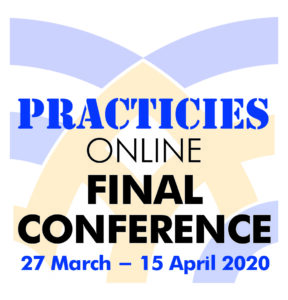The PRACTICIES project’s second toolbox webinar was a presentation of the citizens’ agoras tool by professors Markus Pausch and Heiko Berner from the University of Applied Sciences of Salzburg (AT).
> An efficient prevention tool
In this hour-long video, the two academics, who were experts for the PRACTICIES project explain the characteristics, benefits and methods of implementation of citizens’ agoras and give examples of practices already put in place by the project’s partner cities and regions.
Citizens’ agoras are a useful tool for the early prevention of extremism and violent radicalisation because they open a space for inclusive citizenship participation and empowerment at the local level. They can take various forms (Youth Councils, other types of public meetings, educational programmes in neighbourhoods or schools…), but “in all their forms, citizens’ agoras allow for democratic experience, empowerment and self-efficacy,” says Markus Pausch.
> The four components of a citizens agora
A citizens’ agora has four aspects: 1) information and awareness raising, 2) dialogue and empowerment, 3) voice and participation, and 4) networks and social capital.
1) Information and awareness raising
It is important that all citizens know their political system and rights, but this is far from being the case, in particular among disadvantaged groups of population.
How? This can be addressed by organising information points or communication campaigns.
2) Dialogue and empowerment
This is about listening and exchanging with vulnerable or socially disadvantaged groups. Dialogue, in particular with young people, must tolerate opposing views and conflicts.
How? This can be done by organising workshops or by directly reaching out to the target audience(s), in particular the young, either in person or online. It is important to design a method, to determine what the target groups are, and to create a safe space for dialogue. This approach requires garnering the support of other institutions such as schools or social assistance services.
3) Voice and participation
It means that people affected by a political decision can also participate in it. Even in a democratic system, all the citizens do not have the same opportunities to make their voice heard. Local and regional authorities can implement measures that enable these people to have a voice in the political decision-making process, and they can include the suggestions of citizens in their policies.
How? There are many forms of citizen participation, including those specifically aimed at young people, who are a priority target audience as regards the prevention of radicalisation. Citizenship education in schools and Youth Councils are already quite common in European municipalities. The main challenge is to reach the most disadvantaged groups. It is also important to create a safe environment where participants can express opposing, critical or even provocative opinions.
4) Networks and social capital
Networking means collecting “social capital”, i.e. the relationships we have with other individuals or groups with whom we identify. The notion of social capital is important in early prevention because it is often used as either a means or a goal.
How? It is important to identify the objective that is pursued: for example, is it to strengthen individual contacts or contacts between institutions within a community? Equally important is measuring whether the chosen approach will heighten social cohesion. Lastly, it is important to associate representatives of the target groups in the planning process of early interventions.
> The key aspect of trust
A key finding from existing citizens’ agoras is the need to build trust. Indeed, it is crucial to create a climate of trust with the target groups, in particular the young, which means creating a space where participants can express themselves without fearing being judged. It is thus important to use a methodological approach that enables everyone to express their needs – for example daily life problems, or issues with the parents, or taboos – and opinions.
It is also important to be aware that “young people from different neighbourhoods
are not a homogeneous groups but rather are part of different groups, some dominant and others minority groups. It is thus important to protect these minorities so they can express their opinion,” note Markus Pausch and Heiko Berner. In short, “this is not about trying to establish peace but rather to tolerate conflict, openness and sincerity.”
> Giving a voice to revolt
Many young people are not used to expressing their opinion in a way that meets the standards of democratic debate. This should be taken into consideration and not lead to the suppression of opinions.
This means the primary goal is not to reach a compromise but on the contrary to facilitate the expression of contrary, revolted voices. This is particularly true when working with young people, who should be encouraged to express opposing arguments and unorthodox ideas, which should be answered to in a constructive manner. “Dialogue is more important than achieving a result,” say Markus Pausch and Heiko Berner.
> The importance of evaluation
Evaluation is an equal and crucial part of a project. It should result from a dialogue among all relevant stakeholders and not be seen as a control. Evaluation methods vary depending on the nature of a project and its activities, and there are many available.
Whatever method is chosen, Markus Pausch and Heiko Berner recommend interviewing the relevant groups (organisers, stakeholders, target groups), to systematically collect data (surveys, press clips…), and to ensure participants they will be able to express their views openly and anonymously.
In the field of the prevention of radicalisation and extremism, the evaluation should be designed together with academics, stakeholders and the relevant partners; it must include conceptual, process, and result evaluations; it must include qualitative criteria because of the sensitive nature of the topic, and it is useful to associate experienced experts to the evaluation process.
>>> More information on the PRACTICIES project
>>> More information about the PRACTICIES webinars






